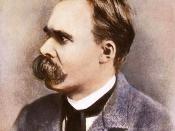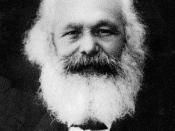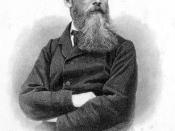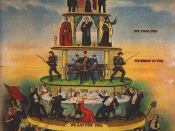According to Marx, a human beings purpose in life is to create. He believes we form and develop ourselves through a collective self-determinism. Opposite to Nietzsche, who is a firm believer in self-determination, Marx values a collective effort to enhance the masses. Marx assumes that through work we define our identity. In the process of working we externalize ourselves in the products that we work on. In the capitalist economy Marx argues that the link between the worker and the product is broken. Contradicting Marx, capitalism serves as a tool for people to define themselves not only by work, but also through other forms of expression. In his Economic- Philosophic Manuscripts, Marx finds fault in the political economy of capitalism and states: From political economy itself, in its own words, we have shown that the worker sinks to the level of a commodity, the most miserable commodity; that the misery of the worker is inversely proportional to the power and volume of his production; that the necessary result of competition is the accumulation of capital in a few hands and thus the revival of monopoly in a more frightful form; and finally that the distinction between capitalist and landowner, between agricultural laborer and the industrial worker, disappears and the whole society must divide into the two classes of proprietors and propertyless workers (Marx 287) We become alienated from the product we work on, which leads us to become alienated from the process of work itself, our species, and ourselves.
Marx sees labor as no longer and end in itself, but rather a means to an end. We labor to make enough to live on rather than to express yourself through your work. If a man defines his life through his work, then this will be the case. However, as Nietzsche would argue, we must define our lives as individuals; individuals who can use work as a means to better one's life. We are inherently creators and work can be used as a means to generate more outlets for personal expression. The opportunity to create is a product of capitalism. Marx felt that capitalism increased the alienation in the separation of the worker from the product. The workers were separated in that the product they produced was no longer personal expression. The worker had no real creative input in the product and the design was completely out of his control. However, in this argument it is important to realize that Marx is not arguing that the worker is not being paid enough. He is arguing that we should work on products that can express ourselves. The fact is that the money can be prevalent, but if the creative input is not present then the work is dehumanizing. However, with the benefits of money from work, the worker is able to create more forms of expression. We are able to educate ourselves, build a future for our families, and create opportunities for society as a whole to advance. Without the opportunity to do this humanity would not be able to grow.
Marx argues that the alienated laborer is incapable of doing meaningful human work. This is because meaningful work requires an on-going connection between the self and the task involved. The alienated workers Marx referred too have had a larger advantage over the workers today, in the sense that they had a self worth outside of the work place. In our modern capitalist economy humans are defined by there jobs. They struggle to hold an identity out of that. This is due to the collective self-determinism proclaimed by Marx. The herd instinct Nietzsche describes in Beyond Good and Evil, explains how and why the workers become self-alienated, which is the root of all alienation. In Nietzsche's description of the herd instinct, the alienation of the laborer would file as a result of this mentality. The herd instinct produces no leaders and no followers. It produces a mass of people herding together in no direction. In the capitalistic economy, workers band together as a mass of workers, not as individual worker with unique purpose. They see themselves as workers and nothing beyond that. They are unable to realize work is simply a means to enhance their condition. Work enables humans to become providers, innovators, creators, designers, and enhancers. This herd mentality leads to a form of alienation. It is an alienation from themselves as individuals. Man expresses himself by his job, not by his personal being. This is the alienation of man. Marx believes in collectivism self-determinism, opposing to Nietzsche's belief in the Ulbermerisch- the overman. Nietzsche sees man as an individual rather than a class. Nietzsche was not a capitalist, however, the system that best promotes and encourages the Ulbermerisch is capitalism. Rather than focusing on the class war, Nietzsche focuses on man and the conflict within the person, whereas Marx focuses on the conflict between the masses and its leaders. Marx's socialistic philosophy would disable the Ulbermerisch from developing a personal self-worth and value. In Nietzsche The Wanderer and his Shadow, he proclaims: As socialism is a doctrine that the acquisition of property ought to be abolished, the people are as alienated from it as they could be. And once they have got the power of taxation into their hands through the great parliamentary majorities they will assail the capitalists, the merchants and the princes of the stock exchange with a progressive tax and slowly create a middle class which will be in a position to forget socialism like an illness from which it has recovered Marx (1880) A self-determined worker who feels he is working to better himself and his family is creating opportunity. The worker who feels he is working only for the sake of making ends meet financially is alienating himself from society, his being, the process, and the product. The exploitation of workers is inevitable for the human condition to advance. A society with nothing will be given little and the choice to grow from there. The morality involved with this cannot be a factor. The stronger will survive and the weak will fail. As Nietzsche believes, the stronger the individual the better he will become. The stronger the individual, the stronger the society will be. Marx believes that capitalism is just a phase in the political economy; however, as long as it continues to create opportunity it will be the strongest.
Marx views capitalism as an entrapment of mankind, rather than an opportunity. As a man, not a worker, capitalism serves as a tool to provide mankind with the benefits of life. These benefits include individual freedom, education, and the spirit of the imagination. For a worker, the sacrifice of work leads to other forms of expression. Marx adequately proves that a worker is alienated from his product in the sense it is not an object f his personal expression. However, the benefit from this alienation is that man is able to sacrafice his work in order to create more space for his expression. He does this by creating the opportunity for himself or for his children to take advantage of the opportunities. The more and more opportunities an individual and society are received, the more they will grow and advance.
In the debate on the black reparation, it is argued that the descendents of the former slaves should be paid back for the cruelties done to their people. Marx would agree that slavery was an extreme form of alienation. The slave was exploited by capitalism. Nonetheless, as capitalism has been proven to do, the slave status was removed and the blacks began to gain more and more opportunity. This is hard to argue considering the moral cruelty involved. However, in a recent interview on 60 Minutes, a young black male argued that black reparation has already been paid. He said to look at the black situation in both America and in Africa. Who is better off? The African-Americans are because with the opportunities arising from capitalism they have been able to better themselves economically and physically. This argument gives rise to a moral debate, however, the fact still remains: capitalism is a tool to help advance society.





